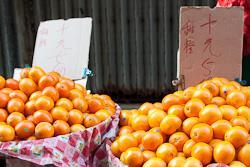
Rumours surrounding the safety of Chinese food products is driving down sales of fresh produce in Vietnam.
Jack Nguyen, a trader with one of the largest Vietnamese fruit importers, has stated that his company’s profits were nearly halved from US$11m in 2011 to $6m in 2012.
While he conceded Vietnam’s sluggish economy has played a factor in this decline, Nguyen stated that ongoing media scaremongering regarding toxic fruit is contributing to negative public perceptions and a move away from Chinese fruit imports.
'It's all about how they can sell more newspapers. Nowadays if you write an article about Chinese products, you immediately get millions of hits online,' he said. 'We lost a lot of money because of this.'
China has emerged as key global exporter of fresh produce and challenged the US’ dominance as a producer and supplier for Asian markets.
However, Chinese fresh produce imports are particularly vulnerable to consumer backlash because of their well-documented instances of food tampering, pesticide overuse and ineffective regulatory powers.
Vietnam's consumers, particularly the country’s growing middle class, are increasingly concerned about the provenance and quality of their food.
There is no exact data available for Vietnamese import volumes of Chinese produce. However, a customs official at major entry point Tan Thanh, Nguyen Quang Bach, estimated that daily fruit imports for 2012 peaked at 2,100 tonnes in the week preceding Lunar New Year, a time of high demand for fresh produce.
In 2013, he believed that only 50 per cent of that amount crossed the border on the busiest day and that information circulating about the dangers of Chinese fruit imports is responsible.
'The information has affected people's psychology,' he said. 'Consumers don't eat Chinese fruits and importers can't sellthem.'



